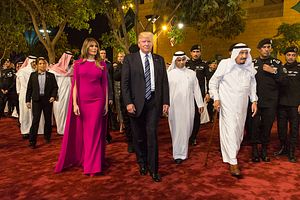The Donald Trump-led Arab Islamic American summit, held in Riyadh this weekend, was supposed to be Pakistan’s moment to cash its first check on the diplomatic investment it has made in the Saudi-led Islamic military coalition – which former Army Chief Raheel Sharif militarily heads. After all, the long standing U.S.-Saudi relationship has helped Islamabad ally itself with both, and at a time when the duo was spearheading an “Islamic” summit it was natural for Pakistan to expect a share of the spotlight.
With this in mind, Prime Minister Nawaz Sharif spent the entire duration of his flight to Riyadh rehearsing his address to the summit, which included leaders of 55 Muslim-majority states. It was time to drive home Islamabad’s perspective on countering Islamist terrorism – the theme of the event – considering Pakistan’s unique role as both victim and counterterrorism proponent. Raheel Sharif heads the counterterror militia, and the country is fourth on the Global Terrorism Index in terms of the most affected states.
Yet Nawaz Sharif wasn’t invited to address the summit. Neither was Raheel Sharif.
It was bad enough that Pakistan didn’t get a say in what was predictably reduced to a Gulf gathering, rather than an “Islamic” summit. Trump’s speech itself further added salt to the wounds.
Not only did the U.S. president identify India as a victim of terror, he failed to acknowledge Pakistan as one. This at a time when the International Court of Justice (ICJ) has stayed the execution of Kulbhushan Jadhav – an alleged Indian spy convicted of terrorism in Pakistan – and when deeming Kashmiri separatist militancy synonymous with “Pakistan-sponsored terrorism” is the official New Delhi stance.
It very well might not have been his intention, but by singling out India alone as a victim of terror among the South Asian states, Trump upheld New Delhi’s narrative on Kashmir, and completely shelved Pakistan’s claims of “India-sponsored terrorism,” specifically in the volatile province of Balochistan.
This would’ve been a setback at most gatherings, but for the U.S.-Saudi leadership to silence Pakistan’s narrative at an “Islamic” summit was particularly damaging, considering that Islamabad has long held Islam as a foreign policy tool and has based its support for the Kashmiri struggle on religious affiliation as well.
Trump also snubbed a request for a meeting with Nawaz Sharif, whom he only met with on the sidelines of the summit, while having well publicized talks with many other leaders.
As the U.S. president joined Saudi King Salman in being high on anti-Iran rhetoric, asking the Muslim world to isolate the nation that Trump said had “fueled the fires of sectarian conflict and terror,” Pakistan’s repeated claim of the Saudi-led coalition not targeting a particular sect or state was significantly dented as well.
In jumping aboard, and militarily spearheading, the Saudi-led military alliance, Islamabad has alienated Tehran to a point that Iran is now openly threatening attacks inside Pakistan to uproot what it calls are “safe havens for Sunni jihadists.”
With its decades-old racist foreign policy vis-à-vis Afghanistan backfiring, ties with India continuing to plunge, and now Iran earmarking it as an integral part of the Saudi camp, Islamabad is surrounded by a hostile neighborhood that is finding common ground in uniting against militancy originating in Pakistan.
And as Pakistan’s immediate neighbors accuse it of supporting terrorism, the snub for Pakistan at a counterterror conference, hosted by the country that Islamabad is going out of its way to protect against the much-touted “Shia crescent,” means that there are no buyers for Pakistan’s narrative on its role against terrorism.
Despite Saudis talking up Pakistan as a “leader of Muslim Ummah” whenever they need military support, Riyadh has never backed Islamabad’s stance on Kashmir, or even condemned Kabul for what Pakistan portrays as Indian voodoo forcing Afghanistan to act out against a “Muslim brother.” In fact Saudi Arabia has multiple defense agreements with India – the country Islamabad claims is responsible for funding terrorism in Pakistan.
While Washington sidelining Islamabad following Trump’s election was long coming, it is the continued lack of Saudi support at the international level that has reduced Pakistan’s status for the Kingdom of al-Saud to that of a security guard, without any contribution in narratives.
If Islamabad still needs a reason to abandon Islam as a foreign policy determinant, it only needs to look at its relations with its “Muslim brothers” in the neighborhood, and the consistent Saudi refusal to even allow Pakistan a say in the global Muslim narrative.
This is especially true when China, the only state that is backing Islamabad and giving it an economic lifeline, has staunch anti-Muslim policies in the region that is going to help Pakistan sustain itself.

































